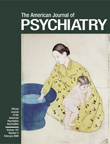Bright Light Therapy’s Effect on Postpartum Depression
To the Editor: Postpartum depression is a mood disorder affecting approximately 10%–15% of women after childbirth. Prompt diagnosis and treatment are crucial for maternal and infant well-being (1). Many women reject treatment with pharmacotherapy, especially while breast-feeding, because they are concerned about the possible deleterious effects of medication on the developing infant. Bright light therapy is an effective treatment for seasonal affective disorder and for nonseasonal depression. We report the cases of two women, both suffering from a major depressive episode with postpartum onset, who were treated with bright light therapy.
Ms. A, a 33-year old woman, developed abrupt changes in her mood within 2 weeks of the birth of her first child. Her symptoms included fatigue, irritability, anxiety, social withdrawal, guilt, and increased appetite with carbohydrate craving. Even after her baby began sleeping through the night, she experienced initial insomnia and unrestorative sleep. The pregnancy had been planned and was uneventful. Labor had had to be induced because of oligohydramnios. A healthy baby was born at term. She had no previous history of depressive episodes or mood disorders. She was otherwise healthy. Ms. A delayed seeking treatment, hoping her condition would improve. Her mood, management of household responsibilities, and competence in taking care of her baby continued to deteriorate; thus she sought treatment at 5 months postpartum. She refused the option of antidepressant medication, consenting instead to a trial of phototherapy by means of a 10,000-lux light box for 30 minutes between 7:00 a.m. and 9:00 a.m. daily. Her baseline Hamilton Rating Scale for Depression score (29 items) was 29; it decreased to 18 after 2 weeks of treatment with light therapy. After 4 weeks of treatment, her score decreased to 11.
Ms. B, a 27-year old woman, experienced an abrupt worsening of her anxious and depressed mood, initial and middle insomnia, anergia, fatigue, and an overwhelmed feeling 1 week after the birth of her second child. The strained relationship with her husband was felt to be the precipitant for her dysphoric feelings during pregnancy, but her mood change had not progressed sufficiently to warrant a diagnosis of major depression. Delivery of a healthy baby was at term after a 28-hour labor. Ms. B was otherwise medically healthy. She refused treatment with antidepressant medication. Conjoint therapy did not reduce her symptoms and hence was discontinued after 1 month. At that time, she accepted a trial of bright light therapy by means of a 10,000-lux light box for 30 minutes between 7:00 a.m. and 9:30 a.m. daily. Her Hamilton depression scale score (29 items) was 28 at baseline; it decreased to 16 after 10 days of treatment, and after 4 weeks, her score was 12.
These two patients showed a good clinical response (i.e., a 75% reduction in Hamilton depression scale scores) to treatment with light therapy. Both patients subjectively reported sufficient improvement in mood and other depressive symptoms, tolerated the treatment well, and reported no adverse effects during the course of treatment.
The use of bright light therapy may represent a viable, nonpharmacologic treatment for postpartum depression, especially for women who choose to breast-feed their babies.
1. Weinberg MK, Tronick EZ: The impact of maternal psychiatric illness on infant development. J Clin Psychiatry 1998; 59(suppl 2):53–61Google Scholar



